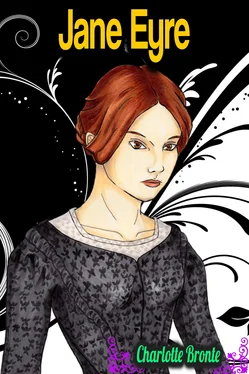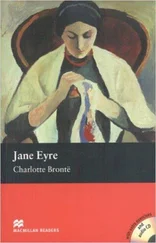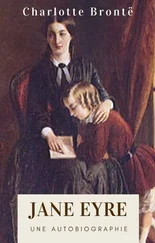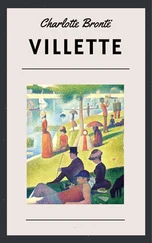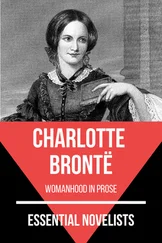“Dear! dear! What a fury to fly at Master John!”
“Did ever anybody see such a picture of passion!”
Then Mrs. Reed subjoined—
“Take her away to the red-room, and lock her in there.” Four hands were immediately laid upon me, and I was borne upstairs.
2
I resisted all the way: a new thing for me, and a circumstance which greatly strengthened the bad opinion Bessie and Miss Abbot were disposed to entertain of me. The fact is, I was a trifle beside myself; or rather out of myself, as the French would say: I was conscious that a moment’s mutiny had already rendered me liable to strange penalties, and, like any other rebel slave, I felt resolved, in my desperation, to go all lengths.
“Hold her arms, Miss Abbot: she’s like a mad cat.”
“For shame! for shame!” cried the lady’s-maid. “What shocking conduct, Miss Eyre, to strike a young gentleman, your benefactress’s son! Your young master.”
“Master! How is he my master? Am I a servant?”
“No; you are less than a servant, for you do nothing for your keep. There, sit down, and think over your wickedness.”
They had got me by this time into the apartment indicated by Mrs. Reed, and had thrust me upon a stool: my impulse was to rise from it like a spring; their two pair of hands arrested me instantly.
“If you don’t sit still, you must be tied down,” said Bessie. “Miss Abbot, lend me your garters; she would break mine directly.”
Miss Abbot turned to divest a stout leg of the necessary ligature. This preparation for bonds, and the additional ignominy it inferred, took a little of the excitement out of me.
“Don’t take them off,” I cried; “I will not stir.”
In guarantee whereof, I attached myself to my seat by my hands.
“Mind you don’t,” said Bessie; and when she had ascertained that I was really subsiding, she loosened her hold of me; then she and Miss Abbot stood with folded arms, looking darkly and doubtfully on my face, as incredulous of my sanity.
“She never did so before,” at last said Bessie, turning to the Abigail.
“But it was always in her,” was the reply. “I’ve told Missis often my opinion about the child, and Missis agreed with me. She’s an underhand little thing: I never saw a girl of her age with so much cover.”
Bessie answered not; but ere long, addressing me, she said—“You ought to be aware, Miss, that you are under obligations to Mrs. Reed: she keeps you: if she were to turn you off, you would have to go to the poorhouse.”
I had nothing to say to these words: they were not new to me: my very first recollections of existence included hints of the same kind. This reproach of my dependence had become a vague sing-song in my ear: very painful and crushing, but only half intelligible. Miss Abbot joined in—
“And you ought not to think yourself on an equality with the Misses Reed and Master Reed, because Missis kindly allows you to be brought up with them. They will have a great deal of money, and you will have none: it is your place to be humble, and to try to make yourself agreeable to them.”
“What we tell you is for your good,” added Bessie, in no harsh voice, “you should try to be useful and pleasant, then, perhaps, you would have a home here; but if you become passionate and rude, Missis will send you away, I am sure.”
“Besides,” said Miss Abbot, “God will punish her: He might strike her dead in the midst of her tantrums, and then where would she go? Come, Bessie, we will leave her: I wouldn’t have her heart for anything. Say your prayers, Miss Eyre, when you are by yourself; for if you don’t repent, something bad might be permitted to come down the chimney and fetch you away.”
They went, shutting the door, and locking it behind them.
The red-room was a square chamber, very seldom slept in, I might say never, indeed, unless when a chance influx of visitors at Gateshead Hall rendered it necessary to turn to account all the accommodation it contained: yet it was one of the largest and stateliest chambers in the mansion. A bed supported on massive pillars of mahogany, hung with curtains of deep red damask, stood out like a tabernacle in the centre; the two large windows, with their blinds always drawn down, were half shrouded in festoons and falls of similar drapery; the carpet was red; the table at the foot of the bed was covered with a crimson cloth; the walls were a soft fawn colour with a blush of pink in it; the wardrobe, the toilet-table, the chairs were of darkly polished old mahogany. Out of these deep surrounding shades rose high, and glared white, the piled-up mattresses and pillows of the bed, spread with a snowy Marseilles counterpane. Scarcely less prominent was an ample cushioned easy-chair near the head of the bed, also white, with a footstool before it; and looking, as I thought, like a pale throne.
This room was chill, because it seldom had a fire; it was silent, because remote from the nursery and kitchen; solemn, because it was known to be so seldom entered. The house-maid alone came here on Saturdays, to wipe from the mirrors and the furniture a week’s quiet dust: and Mrs. Reed herself, at far intervals, visited it to review the contents of a certain secret drawer in the wardrobe, where were stored divers parchments, her jewel-casket, and a miniature of her deceased husband; and in those last words lies the secret of the red-room—the spell which kept it so lonely in spite of its grandeur.
Mr. Reed had been dead nine years: it was in this chamber he breathed his last; here he lay in state; hence his coffin was borne by the undertaker’s men; and, since that day, a sense of dreary consecration had guarded it from frequent intrusion.
My seat, to which Bessie and the bitter Miss Abbot had left me riveted, was a low ottoman near the marble chimney-piece; the bed rose before me; to my right hand there was the high, dark wardrobe, with subdued, broken reflections varying the gloss of its panels; to my left were the muffled windows; a great looking-glass between them repeated the vacant majesty of the bed and room. I was not quite sure whether they had locked the door; and when I dared move, I got up and went to see. Alas! yes: no jail was ever more secure. Returning, I had to cross before the looking-glass; my fascinated glance involuntarily explored the depth it revealed. All looked colder and darker in that visionary hollow than in reality: and the strange little figure there gazing at me, with a white face and arms specking the gloom, and glittering eyes of fear moving where all else was still, had the effect of a real spirit: I thought it like one of the tiny phantoms, half fairy, half imp, Bessie’s evening stories represented as coming out of lone, ferny dells in moors, and appearing before the eyes of belated travellers. I returned to my stool.
Superstition was with me at that moment; but it was not yet her hour for complete victory: my blood was still warm; the mood of the revolted slave was still bracing me with its bitter vigour; I had to stem a rapid rush of retrospective thought before I quailed to the dismal present.
All John Reed’s violent tyrannies, all his sisters’ proud indifference, all his mother’s aversion, all the servants’ partiality, turned up in my disturbed mind like a dark deposit in a turbid well. Why was I always suffering, always browbeaten, always accused, for ever condemned? Why could I never please? Why was it useless to try to win any one’s favour? Eliza, who was headstrong and selfish, was respected. Georgiana, who had a spoiled temper, a very acrid spite, a captious and insolent carriage, was universally indulged. Her beauty, her pink cheeks and golden curls, seemed to give delight to all who looked at her, and to purchase indemnity for every fault. John no one thwarted, much less punished; though he twisted the necks of the pigeons, killed the little pea-chicks, set the dogs at the sheep, stripped the hothouse vines of their fruit, and broke the buds off the choicest plants in the conservatory: he called his mother “old girl,” too; sometimes reviled her for her dark skin, similar to his own; bluntly disregarded her wishes; not unfrequently tore and spoiled her silk attire; and he was still “her own darling.” I dared commit no fault: I strove to fulfil every duty; and I was termed naughty and tiresome, sullen and sneaking, from morning to noon, and from noon to night.
Читать дальше
